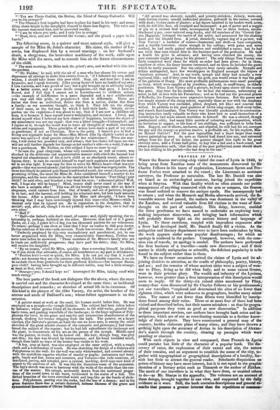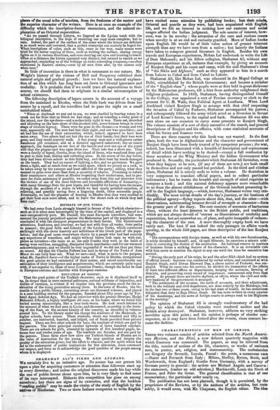TRAVELS IN LTCIA.
WHEN the Beacon surveying-ship visited the coast of Lycia in 1842, to' bring away from Xanthus some of the monuments discovered by Sir Charles Fellows in his tours of exploration, Lieutenant Sprat( and Pro.- fessor Forbes were attached to the vessel ; the Lieutenant as assistant surveyor, the Professor as naturalist. The late Mr. Daniell was also on board as an arclueolOgical amateur, having joined the expedition when at Smyrna. With that fatality which so often attends our public management of anything connected with the arts or sciences, the Beacon was found unfitted to remove the antique spoils. She consequently had fo return ; and when the Monarch and Medea afterwards arrived, the fa- vourable Season had passed, the malaria was dominant in the valletof the Xantbus, and several valuable lives fell victims to the want of fore- thought on the part of somebody. This delay, however, enabled the three gentlemen we have named to undertake an exploring tour • • making important discoveries, and bringing back information which) will probably throw light on the ancient history and language of Lycia. To these exertions, coupled with imprudent exposures after . a fever had developed itself, Mr. Daniell finally fell a victim. As the antiquities and literary department were to have been undertaken by him, the work appears under some popular disadvantages; for which an . apology is tendered in the preface. Compared, however, with the com- mon run of tray* no apology is needed. The authors have performed the first business of a traveller—made new discoveries ; and if their matter is chiefly antiquarian or scientific, the deficient popularity is to be found in the subject rather than in them.
We have on former occasions noticed the claims of Lycia and its ad- joining districts to attention, as the cradle of philosophy, poetry, history; and art ; and the remains of whose ancient cities were a subject of won- der to Pliny, living as he did when Italy, and to some extent Greece, were in their pristine glory. The wealth and industry of the Lycians, however, were greater than a first interpretation of this description would' seem to imply. Of the thirty-six ruined cities mentioned by Pliny, twenty-four were discovered by Sir Charles Fellows or his predecessors; yet our travellers "explored and determined the sites of no fewer than' eighteen cities, which were unknown to geographers, besides many minor sites. The names of not fewer than fifteen were identified by inscrip- tions found among their ruins. Three or at most four of these had been visited and described before, but their names mistaken : so that for geogm., phical purposes they were as good as new discoveries." In addition to these important services, our authors have brought back coins and in- scriptions, which are of use as contributing materials to a further know- ledge of their subjects. They have constructed a general map of the country, besides elaborate plans of many cities; and they have thrown a striking light upon the accuracy of Arrian in his description of Alexan- der's march through the country, clearing up passages which were puzzling or obscure.
With such objects in view and compassed, these Travels in Lyeia could partake but little of the character of a popular book. The dis- covery of ruins, the exploration of their extent and site, the nature of their remains, and an argument to establish the name of the city, to- gether with topographical or geographical descriptions of a locality, fur- nish but little to attract the general reader. Scholastic disquisition on points of history may have more interest, but it is not equal to the graphic sketches of a literary artist such as Titmarsh or the author of Eothen. The merit of our travellers is in what they have done, or enabled others to do—as Mr. Sharpe in the appendix. The volumes are an account of these doings, brought together in one view, and supported by the daily evidence as it were. Still, the book contains descriptions and general re- marks that possess a greater interest than the repetitions or common-
places of the usual tribe of tourists, from the freshness of the matter and the superior character of the writers. Here is at once an example of the difficulty which the inscription-hunter encounters, and the natural ex- planation of an Oriental superstition.
"As we passed through Limyra, we lingered at the Lycian tomb with the bilingual inscription in the hope of rendering our copy more complete; but in vain. Indeed, the pert of the surface of the stone where the letters are deficient is so much worn and corroded, that a perfect transcript can scarcely be hoped for. When inscriptions of value, such as this, came in our way, many means were tried for the better copying of them, such as wetting the surface, casting strong lights on it in various directions, and even shutting our eyes and trusting to touch. Often at a distance the letters appeared very distinct, but seemed to vanish as we approached; reminding us of the writings on racks concealing treasures,—so often mentioned in Eastern stories,—seen by all men from afar, by the chosen only when near."
So little of invention is there in what is consonant to our nature. Mr. Wright's history of the visions of Hell and Purgatory exhibited their natural origin and gradual growth : here we have the natural explana- tion of an idea which has long been set down to Oriental ignorance and credulity. It is probable that if we could trace all superstitions to their source, we should find them to originate in a similar misconception of actual existences.
The following description of lepers occurs in the account of a voyage from the mainland to Rhodes, when the little bark was driven from her Course by a squall, and the travellers had to pass the night on a small uninhabited island.
"When at daybreak we put out to sea, we were startled by hearing voices in a creek not far from that in which we had slept; and on rounding a rocky point of the island, saw the speakers—and a melancholy sight it was. There sat, drenched and shivering on the bare shore of this desolate islet, seven human beings in every stage of virulent leprosy. Three were far gone in the disease,—a woman and two men, apparently old. The men had lost their sight, and one was speechless; and all had lost the use of their extremities, which, indeed, appeared to have been eaten away. Two others had not lost the use of their hands; but their toes were gone, and they could scarcely walk. A fine young man and a well-grown rather handsome girl remained, and at a distance appeared unharmed; but on nearer approach, the bandages on one foot of the female and over one eye of the youth told that the plague-spot was upon them too. Their tale was a short one. They were a family of lepers, Greeks, from the island of Syme, who wandered from port to port in their boat, fishing and collecting alms. In the storm of the day before, they had been driven ashore in this little bay, and their boat lay much damaged on the beach. They had no means of lighting a fire, and no provisions. We gave them a light, and as much food as we could spare, which we placed on a rock, to be taken away by the younger and least afflicted of the party; adding, what they seemed to prize even more than food, a quantity of tobacco. Promising to inform their countrymen and others at Rhodes respecting their misfortunes, and to pro- cure for them assistance if possible, we sailed away from this sad interview with the victims of one of the most hideous and incurable afflictions of humanity,— with many blessings from the poor lepers, and thankful for having been the means, through the accident of a storm in which we had nearly perished ourselves, of relieving, and possibly saving from a lingering death, these miserable people. Eventually, we had the pleasure of hearing in Rhodes that they were enabled to get their boat once more afloat, and to leave the desert rock on which they bad
been cart." _
ESTIMATE OP.TUE TURKS.
We had come from Lycia strongly biassed in favour of the Turkish character— Ouch AS it is .vrhen seen uncorrupted by the vices. of the capital, and displayed in a race comparatively pure. Mr. Daniell, like most European travellers, bad com- menced his journey prejudiced against the Mahometan part of the population : he concluded it with the strongest prepossessions in their favour. The disinterested attentions, frankness and courtesy, we had met with from all ranks, from paths to peasant; the good faith and honesty of the Lycian Turks, which contrasted strikingly with the clever knavery and selfishness of the Greek part of the popu- lation; and the good sense everywhere shown by a people who had had scarcely any experience of travellers, and might without blame look upon us with sus- picion as intruders—the more so as the only Franks they were in the habit of seeing were reckless, smuggling, dissipated leech. merchants--call for our warmest acknowledgments; and we should be very ungrateful if we did not thus put them on record. All that Sir Charles Fellows has said in favour of the Turks of Asia Minor we can fully bear out. What we saw—and, what is more to the purpose, what Mr. Sandford knew—of the higher ranks of Tails in Rhodes, strengthened the good opinion we had contracted of their nation, and raised considerably our estimation of their intelligence and acquirements; which are certainly quite equal with, if not superior to, those of most Levantine Franks though the latter be clad in European costume and familiar with European customs.
EDUCATION AT
That the good points of the Turkish character, such as it displayed itself to us, he deeper than in mere external politeness, natural mildness of disposition, and dislike of exertion, is evident if we inquire into the provision made for the in- struction of the rising generation among them. In the town of Rhodes, the Os- manila have a public library, containing about one thousand volumes, and placed fa a neat building erected for the purpose, founded about fifty years ago by Tur- Wind Agasi Achmet Aga. We had an interview with the present librarian, Hadgi Mehemet Effendi, a highly intelligent old man, at his house, where we found him buried among manuscripts, like a true book-worm. He took much interest in the account of what we had seen in Lycia; and discoursed, according to the learn- ing of the East, on the ancient history of the country, as described in volumes around him. To the library under his charge the students of the atadreseh, or higher schools, have access. These students, about one hundred and fifty in number, are instructed, boarded, and lodged, out of funds provided from private bequest. There are five other schools for boys, the teachers of which are paid by the parents. The three principal number upwards of three hundred scholars. There are six schools for girls, attended by upwards of five hundred pupils, be- tween four and twelve years of age. The teachers are females, and are paid by the parents. These facts show how alive our Turkish friends of Rhodes are to
the value of instruction for the young. We may question and despise the quality of the education given; but the effort to educate, and the spirit which has
led to the endowment of public institutions for free education, most command our respect, and force us to acknowledge the good qualities of the people among whom skis displayed.



























 Previous page
Previous page